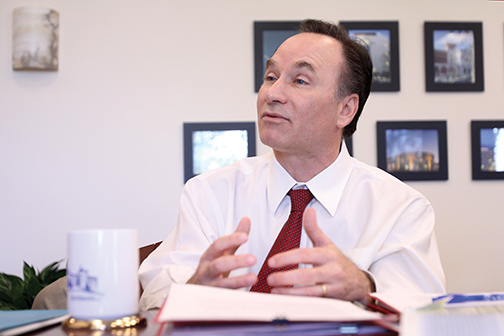Last Friday, San Diego State President Elliot Hirshman announced on his blog that he had approved the Campus Fee Advisory Committee’s recommendation for a $200 fee increase nearly two weeks earlier.
“We haven’t traditionally announced fees,” Hirshman said during a recent interview. “We wanted to find a way that could engage the campus community in a thoughtful discussion, not an inflammatory discussion.”
Hirshman approved the fee on March 3, three days after CFAC made its recommendation. California State University Chancellor Timothy White then approved the fee by the end of the week, on March 7.
Following CFAC’s Feb. 28 decision to recommend a $200 fee increase, a vocal group of students began a series of protests against the proposed fee. The group particularly criticized the alternative consultation process used to inform students of the fee as lacking in transparency.
“In a lot of ways we are more concerned with the process than the result,” Student Success Fee protester Nadir Bouhmouch said. “It just didn’t feel right.”
The protesters met with administrators in Manchester Hall on Monday, March 3 to discuss their concerns about the fee increase. As they drafted their demands, they were told that Hirshman was not currently in the building and had yet to receive the fee recommendation from CFAC.
The Student Success Fee is not unique to SDSU. Many other CSUs, including Northridge, Pomona and Long Beach, have all seen similar fee increases despite a CSU system wide pledge to freeze student tuition.
Student and faculty protests at Sonoma State recently halted a proposed fee increase of $250, also named Student Success Fee, less than a week before Hirshman approved SDSU’s fee increase. Sonoma State’s president waited roughly a week after the school’s own CFAC made its recommendation before making a decision, during which around 1,000 students and faculty protested the fee.
Sonoma State also employed the alternative consultation method of voting for students instead of a school-wide referendum.
SDSU political science professor and student advisor Brian Adams said the university has had trouble passing fees through the referendum method in the past, which may explain why CFAC chose alternative consultation.
In 2004, SDSU attempted to pass the $80-per-semester Instructional Related Activities fee by referendum and students voted down the fee, Adams said. SDSU’s then-President Stephen Weber passed the fee despite the vote against it. Since that time the university has often turned to alternative consultation to pass fees, Adams said.
The most recent fee that was passed through the alternative consultation method was a $65 Student Health Services fee. Only four forums were held during the alternative consultation process for this fee and student turnout was extremely low.
CFAC member Jonathan Cole said CFAC held almost 10 times more forums for the Student Success Fee and had exponentially more students. Cole said he thought that compared to past fees, the Student Success Fee had a significantly higher turnout, giving it more legitimacy.
“I think enough students showed up to give the decision some real weight,” Cole said.
Adams said the process should still be in question.
“If you are going to have a vote for something, you should probably actually have a referendum,” Adams said.
Photo by Jordan Owen, senior staff photographer







